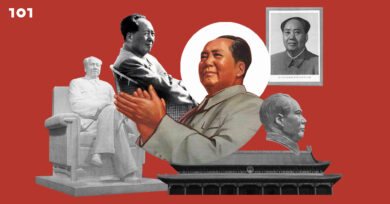Peter Ungphakorn Story
Papimol Lotrakul Illustration
[box]
Brexit has almost completely dominated British politics. A strange calm briefly interrupted months of hectic activity, but not for long. Peter Ungphakorn considers five lessons learnt so far. Part 2: dishonesty and trade-offs
[/box]

For months, the United Kingdom’s chaotic efforts to set up its departure from the European Union (Brexit) saw almost daily twists and turns. Tension mounted and the British moved ever closer to crashing over the cliff-edge and out of the EU, with only the flimsiest of parachutes.
This is the second part of five on thoughts on what happened in the last couple of years and on what lies ahead. Several have been discussed before. They all contain new developments:
- after all the frantic to-ing and fro-ing, almost nothing has changed for Britain
- nearly three years of political debate has failed to produce better-informed arguments
- if those past three years were bad, what lies ahead is going to be worse
- Theresa May’s handling has been disastrous but she might still get what she wants — just
- simplistic definitions of democracy and sovereignty are unhelpful
2. Dishonesty and a failure to recognise trade-offs
And still they keep coming. The “fantasies” about Brexit. (There are better words but they’re not very polite.) And they just get worse. Some are dressed up in technical detail, which few will check.
Leaving the EU without a deal will wipe out British agriculture and destroy 3.5 million jobs, the World Trade Organization (WTO) says — it won’t, and the WTO has never said anything of the kind.
Or, the WTO has a magic clause called GATT Article 24, which will come to the rescue in an emergency caused by no deal — it won’t: GATT Article 24 only applies once there is a deal.
The UK is polarised. Moderate voices of reason are drowned out. The media, obsessed with partisan politics, don’t help much. The tabloid press simply inflame the debate. A lot of voters are fed up with the bickering and are uninterested in the detail.
Many say “just leave!” and turn to right-wing pro-Brexit parties who campaign for exactly that, without any details of what kind of Brexit they want, or how they would try to achieve it. At the time of writing, those are the parties leading the British opinion polls on the European Parliament elections.
So a complicated issue, covering everything from trade to security, relies on an over-simplified debate (see this earlier article). Most people don’t have the patience or the time to invest in learning about the implications. Few are willing even to accept that the other side may have a point.
A handful of prominent soft leavers have become so disillusioned by the aggressive tone of the hard Brexiters that they have now declared they would prefer to stay in the EU. A few former Remainers accept the argument that all the prevarication is a “betrayal” of the referendum result and have become more committed leavers on democratic grounds.
There is still a spectrum of opinions. Some Remainers still want the UK to stay in the EU (through a second referendum). Some accept the decision to leave but want to minimise the damage by keeping very close economic ties to the EU.
Some Leavers had always wanted to stay close to the EU (like non-members Norway and Switzerland). Hard Brexiters consider leaving to be a bigger prize than any damage it might cause.
After three years, much more information is now available through discussions, hearings, research and explainers. Far from being better-informed, the debate is, if anything, worse.
Numerous independent, rigorous studies confirm Brexit’s negative economic impact. The scale depends on the form of Brexit. Instead of seeking to soften the blow, hard Brexiters dismiss them as “project fear”.
Many frustrated voters blame politicians’ squabbling — and not the complexity of the exercise — for the deadlock. May herself has drawn on that frustration by claiming to be on the public’s side against the politicians, further infuriating MPs.
Crucially missing from much of the debate is a recognition that every single option under discussion involves trade-offs.
Staying close to the EU economically but outside it (as with Norway) means a smaller economic hit and some reclaimed “sovereignty” (whatever that means). The cost is accepting a lot of EU rules and regulations, with less say in them than as an EU member.
A less integrated relationship such as the free trade deals the EU has with Canada or Japan, means more independence in policy and rule-making, at the cost of reduced access to the EU market for goods and particularly services.
And so on.
Those trade-offs are rarely discussed seriously. The downsides are dismissed. The economic costs of leaving the EU can be made up by trade deals with other countries, it’s claimed — they can’t. From time to time pure nonsense dressed up as academic study [1] is thrust in our faces.
On top of that, two issues are critical. One is the prospect of leaving the EU without a deal. Most independent analysis concludes that the impact would be serious.
For over a year, Theresa May insisted that walking away with “no deal” was a credible threat, despite the damage her own government acknowledges it would cause to the UK (and less so to the EU). It’s now clear it was a bluff. She looked over the edge and retreated.
The other is the Irish border. In the draft Withdrawal Agreement, the UK and EU agreed to avoid bringing infrastructure back to the border. This was removed in 2005 under the 1998 Belfast Agreement, which ended decades of violence and paramilitary conflict.
The draft Withdrawal Agreement includes a “Backstop”, a failsafe to avoid setting up checks for goods crossing the border. It’s complicated and explained here, here and here. The bottom line is that unless some other solution is found, the UK and EU would have the same tariffs on imports from other countries (a “customs union”) and the UK would adopt a number of EU regulations.
This was unacceptable to hardcore Brexiters, who uncompromisingly refuse to acknowledge almost any trade-offs. The most extreme argument was that it was an EU-Irish plot to keep the UK under the EU’s thumb forever.
They demanded changes to the backstop. The EU refused. They called for a time limit on it, which would defeat the purpose of a failsafe. Or they claimed technology would avoid infrastructure — a solution that doesn’t exist anywhere in the world, and is unlikely to be available for a long time, if ever.
Faced with the possibility that Brexit might be scrapped, some grudgingly switched to vote for the Withdrawal Agreement, and the majority against it in the House of Commons fell. They would turn their attention to the next stage: the negotiations over the future relationship.
__________________________
Previously: Red Queen Theresa’s Race
Next: They ain’t seen nothing yet
__________________________
Find out more
- Article 50 two years on (The UK in a Changing Europe, 2019)
- Negotiating Brexit: Preparing for talks on the UK’s future relationship with the EU (Institute for Government, 2019)
- Brexit: A Love Story? (Audio — a highly recommended series of BBC Radio Four podcasts, 2018–19)
__________________________
Previous articles on Brexit
- And I leave you with Brexit (again), as it heads into ever darker hours (December 21, 2018)
- Five days of mathematical impossibility in the parallel universe of Brexit (October 19, 2018)
- When complexity challenges public opinion and democracy. Part 3—Brexit, two years later (June 22, 2018)
- Can a UK-EU Brexit deal really emerge from this chaos? (June 27, 2017)
See also the author’s blog
__________________________
เชิงอรรถ
[1] I know that’s a strong claim. The author is, after all, a professor of economics. But see for example this immediate reaction or this one — the article was published just before the Easter weekend, so reaction has been muted. Meanwhile, here’s a detailed critique of an earlier study by the same author. The point is not that Brexiters are always wrong. They aren’t; nor are Remainers always right. But some Brexiters create fantasies to justify their positions instead of being realistic and accepting downsides
Peter Ungphakorn is based on the shores of Lake Léman in Switzerland. He spent almost two decades with the WTO Secretariat, Geneva. Before that he worked for The Nation and the Bangkok Post. He now writes for IEG Policy on agricultural trade issues and blogs on trade, Brexit and other issues at https://tradebetablog.wordpress.com/. He tweets @CoppetainPU.



